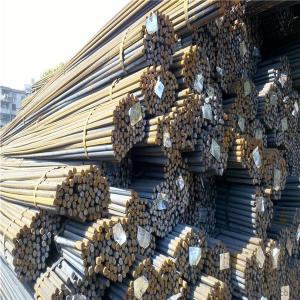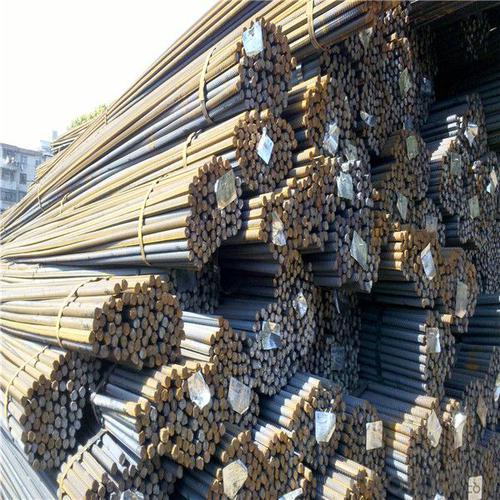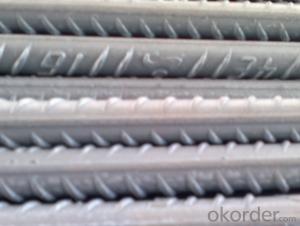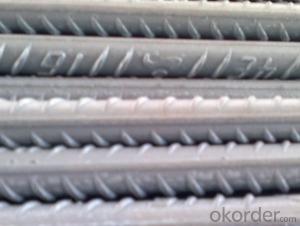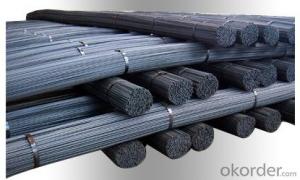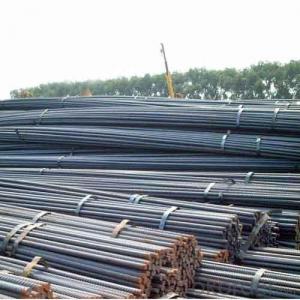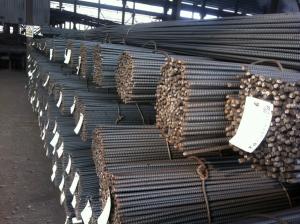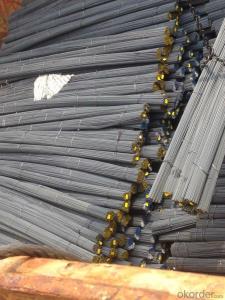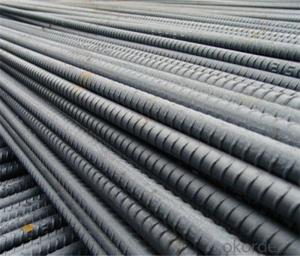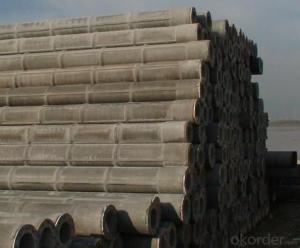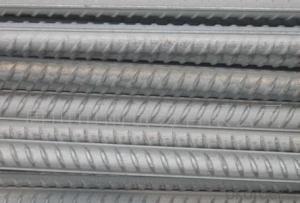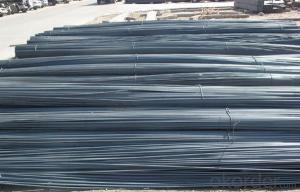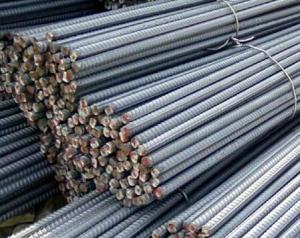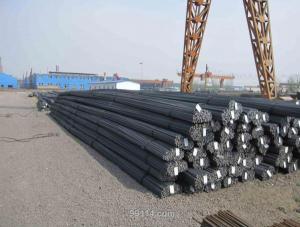Steel deformed bar good quality for constraction
- Loading Port:
- Qingdao
- Payment Terms:
- TT OR LC
- Min Order Qty:
- 1000 m.t.
- Supply Capability:
- 19452 m.t./month
OKorder Service Pledge
OKorder Financial Service
You Might Also Like
Specification
Rebar (short for reinforcing bar), also known as reinforcing steel, reinforcement steel, is a steel bar or mesh of steel wires
used as a tension device in reinforced concrete and reinforced masonry structures to strengthen and hold the concrete
in tension. Rebar's surface is often patterned to form a better bond with the concrete.
Steel rebar is bars of steel commonly used in construction, especially for reinforcing concrete structures such as driveways,
foundations, walls, and columns. These bars come in different sizes and strength grades, and can be smooth or may include
deformations that provide greater adhesion for concrete poured over the bars. When used in poured concrete, the bars are
typically placed in a grid pattern, the concrete poured over them, and then readjusted to maintain the proper shape while the
concrete sets. Steel rebar can be purchased from a number of manufacturers and is often found at construction retailers or large hardware stores.
Our Advantage:
High quality steel products from 1 class mills in China
Reasonable price
Professionalism of the products
On-time delivery
Complete documents and certificates
Sincere service to meet our clients' requirements
Product Description :
Chemical composition (%): | Steel | C | Si | Mn | P | S | Ceq | ||||
HRB335 |
0.25 |
0.80 |
1.60 |
0.045 |
0.045 | 0.52 | |||||
HRB400 | 0.54 | ||||||||||
HRB500 | 0.55 | ||||||||||
Mechanical properties | Steel | Rel/ MPa | Rm/ MPa | A/ % | Agt/ % | ||||||
≥ | |||||||||||
HRB335 | 335 | 455 | 17 |
7.5 | |||||||
HRB400 | 400 | 540 | 16 | ||||||||
HRB500 | 500 | 630 | 15 | ||||||||
Package: | Standard export packing or as customer's request | ||||||||||
Application: | Construction, building, bridge, road. ect | ||||||||||
Payment terms | 1).100% irrevocable L/C at sight. | ||||||||||
Delivery time | 15-30 days after receipt of L/C or deposit by T/T | ||||||||||
Features
1、Pure steel quality, stable chemical contents, small tolerance.
2、Constant Quality, good drawing performance.
3、High dimension accuracy degree, accuracy degree of Level C up to 80%, smooth surface, less scale, easy to be pickled.
4、Automatic bundling with 4 lines by Machine in tidy and good looks
5、Big high quality percentage, small coil percentage, and heavy coil weight for Hard Coil.
6、High sorbitizing percentage.
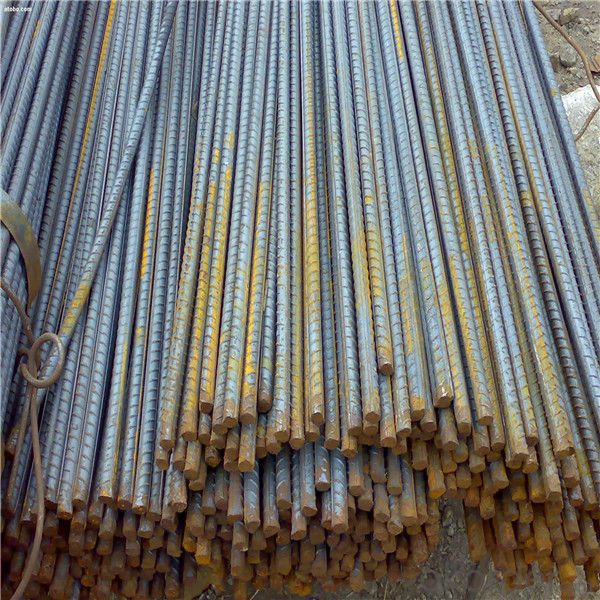
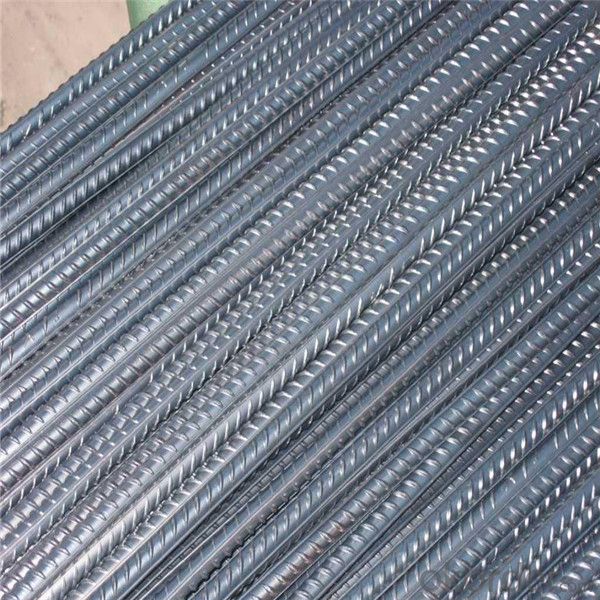
Packing:
In bundles, each bundle weight 3.5 tons. Load by container or by bulk verssel.
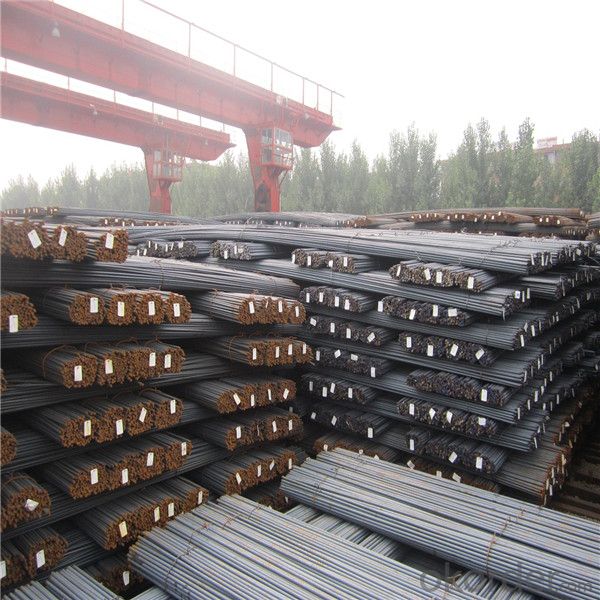

Our service
(1) We cooperate with famous factories with advanced equipment and well trained workers.
(2) We can provide factory price with trading company service.
(3) We continuously work on the improvement of our processes, guaranteeing consistently high standards
of quality to keep none compensation.
(4) We guarantee 24 hours response and 48 hours solution providing service.
(5) We accept small order quantity before formal cooperation.
(6) We deliver the agreed quality at the agreed time, reacting to changes in customer wishes in a flexible way.
(7) Due to our volume and selling power, we have excellent freight rates with shipping lines.
(8) We strive to always be fair and honest in our dealings with customers.
(9) We strive to work together with customers to achieve much more than we can achieve alone.
(10) Through our passion and commitment we aim to be a market leader in all our key markets. To maintain
our position as market leader we must continue to add value in all that we do.
FAQ:
1.Q: What's your MOQ(minimum order quantity)?
A: One full container, mixed acceptable .
2. Q: What's your packing methods?
A: Packed in bundle or bulk ..
3. Q: How can I buy CNBM products in my country?
A:Please send us an inquiry or email ,we will reply to you if there is distributor in your country
4. Q: Can we visit your factory?
A: Warmly welcome. Once we have your schedule, we will arrange the professional sales team to follow up your case.
5. Q: How long does it take to get the product if i place an order?
A:With the process of your requirements,we will pack and deliver in 3-7 days. If it is by sea shipment,it will take 15-45 days depending on different locations
- Q: How do steel rebars affect the overall crack control of concrete?
- Steel rebars play a crucial role in controlling cracks in concrete structures. The incorporation of steel rebars in concrete significantly enhances its tensile strength, which is otherwise quite low. When concrete undergoes tensile forces, such as those caused by drying shrinkage, temperature changes, or applied loads, it tends to crack. However, the presence of steel rebars helps to mitigate and control these cracks. Rebars act as reinforcement, providing additional strength to the concrete. They resist the tensile forces, preventing the concrete from easily cracking. When tensile forces are applied to the reinforced concrete, the rebars carry a significant portion of the load, reducing the stress on the concrete and minimizing crack formation. Moreover, the bond between the steel rebars and the concrete is integral in crack control. The bond ensures that the rebars effectively transfer the tensile forces to the concrete, enhancing its overall crack resistance. This bond also helps in distributing the applied loads evenly and reducing the risk of localized cracking. Furthermore, steel rebars can also be used to control crack widths in concrete. By specifying the appropriate diameter, spacing, and arrangement of the rebars, engineers can influence the crack widths to meet design requirements. The rebars act as barriers, limiting the width of cracks that may occur, thus maintaining the structural integrity of the concrete. In summary, steel rebars have a positive impact on the overall crack control of concrete. They enhance the tensile strength of concrete, resist tensile forces, distribute applied loads, and limit crack widths. By incorporating steel rebars in concrete, engineers can ensure the durability and longevity of concrete structures by effectively controlling crack formation and minimizing their negative consequences.
- Q: What are the common defects observed in steel rebars?
- Steel rebars can exhibit several common defects, including rust and corrosion, cracks and fractures, lack of bond, bent or deformed shapes, dimensional inaccuracies, and inclusions or impurities. When exposed to moisture and oxygen, rebars are susceptible to rust and corrosion, which weaken their structural integrity and compromise the overall strength of concrete structures. Various factors such as excessive bending, improper handling during transportation and installation, or overloading can lead to cracks and fractures in rebars, reducing their load-bearing capacity and affecting the performance of concrete structures. Adequate bond between rebars and the surrounding concrete is crucial for effective load transfer, but poor surface preparation, improper placement, or the presence of contaminants can result in a lack of bond and reduced structural strength. Improper bending techniques, excessive bending, or mishandling can result in rebars with incorrect shapes or deformities, compromising their structural integrity and load-bearing capacity. Steel rebars must conform to specific dimensional tolerances to ensure proper fit and alignment within concrete structures, but manufacturing errors or improper storage and handling can cause dimensional inaccuracies, leading to difficulties during installation and potentially impacting structural performance. Ideally, steel rebars should be free from any inclusions or impurities that can weaken the material, but inadequate quality control during the manufacturing process can result in the presence of foreign materials or impurities, reducing the strength and durability of rebars. To minimize these defects and ensure the long-term structural integrity of concrete structures, it is important to implement proper quality control measures and adhere to industry standards during the manufacturing, transportation, and installation of steel rebars.
- Q: Can steel rebars be used in structures with high resistance to fire?
- Yes, steel rebars can be used in structures with high resistance to fire. Steel has a high melting point and retains its strength even at high temperatures, making it suitable for use in fire-resistant structures. Additionally, steel rebars can be coated with fire-resistant materials such as epoxy or intumescent coatings to further enhance their fire resistance. These coatings create a protective layer that prevents the steel from reaching its critical temperature and losing its structural integrity during a fire. Therefore, steel rebars are commonly used in various fire-resistant structures such as high-rise buildings, bridges, and industrial facilities where fire safety is a critical consideration.
- Q: How do steel rebars provide reinforcement to concrete?
- Steel rebars provide reinforcement to concrete by adding strength and durability to the structure. When embedded within the concrete, rebars act as tension members, resisting forces that would otherwise cause cracking or failure. The high tensile strength of steel rebars helps to distribute and absorb load, enhancing the overall structural integrity of the concrete.
- Q: Can steel rebars be used in the construction of residential buildings?
- Yes, steel rebars can be used in the construction of residential buildings. Steel rebars are commonly used in reinforced concrete structures for their strength and durability. In residential construction, steel rebars are primarily used to reinforce concrete foundations, beams, columns, and slabs. They provide additional support and help enhance the structural integrity of the building, ensuring it can withstand various loads and forces. Steel rebars are preferred over other materials for their high tensile strength, resistance to corrosion, and ability to withstand extreme weather conditions. Additionally, they are easily available, cost-effective, and can be customized to meet specific building requirements. Therefore, steel rebars are an essential component in the construction of residential buildings, ensuring their long-lasting stability and safety.
- Q: What is the role of steel rebars in the construction of water storage tanks?
- Steel rebars play a crucial role in the construction of water storage tanks as they provide structural reinforcement and enhance the overall strength and stability of the tank. These rebars are embedded within the concrete walls of the tank, helping to distribute and resist the forces exerted by the weight of the water and any external pressure. Thus, by reinforcing the concrete, steel rebars ensure that the water storage tank can withstand the required load and remain durable and safe over time.
- Q: Can steel rebars be used in architectural detailing?
- Yes, steel rebars can be used in architectural detailing. Steel rebars are often used to reinforce concrete structures and provide additional strength and stability. In architectural detailing, rebars can be incorporated into the design to enhance the structural integrity of the building or to create unique and intricate patterns. Rebars can be bent, shaped, and placed in various configurations to achieve the desired architectural effect. Additionally, steel rebars are durable, resistant to corrosion, and readily available, making them a popular choice in architectural detailing.
- Q: Can steel rebars be used in structures with high resistance to moisture?
- Steel rebars can be used in structures with high resistance to moisture. However, it is important to note that steel is susceptible to corrosion when exposed to moisture for prolonged periods. To mitigate this risk, protective measures such as proper concrete cover and waterproofing techniques must be employed. Additionally, using steel rebars with corrosion-resistant coatings or alloys, such as epoxy-coated or stainless steel rebars, can further enhance the resistance to moisture. Proper design, construction, and maintenance practices are crucial to ensure the longevity and durability of structures in high-moisture environments.
- Q: Like a steel rebar and wire spiral, is the same? What's the difference?
- Generally, the thickness of the plane is about 1/30 of the span, and the value is more than 80. The higher the mark of commodity concrete, the higher the price, the different areas are, the average is about 350.
- Q: How do steel rebars affect the overall safety of construction projects?
- Steel rebars play a crucial role in enhancing the overall safety of construction projects. By reinforcing concrete structures, rebars significantly increase their strength, durability, and resistance to various forces such as tension, compression, and shear. This reinforcement helps prevent structural failure, collapse, and damage caused by external factors like earthquakes, heavy loads, or extreme weather conditions. Ultimately, the use of steel rebars ensures the stability and integrity of construction projects, ensuring the safety of occupants and the longevity of the structures.
Send your message to us
Steel deformed bar good quality for constraction
- Loading Port:
- Qingdao
- Payment Terms:
- TT OR LC
- Min Order Qty:
- 1000 m.t.
- Supply Capability:
- 19452 m.t./month
OKorder Service Pledge
OKorder Financial Service
Similar products
Hot products
Hot Searches
Related keywords
